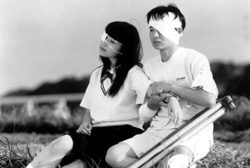go to WASHINGTON FREE PRESS HOME (subscribe, contacts, archives, latest, etc.)
Jan/Feb 2001 issue (#49)
|
|
Moonlight Whispers
Grand Illusion, February 2--15
(206) 523-3935

Girl hits boy with kendo stick in Shiota's Moonlight Whispers |
In the opening scene of Akihiko Shiota's Moonlight Whispers, a boy and girl are practicing kendo, a martial art based on samurai swordsmanship. The boy prompts the girl to attack, and she strikes. Thus is revealed the essence of their relationship, setting the tone for a film that might be subtitled "I Was A Teenage Sadomasochist."
Satsuki is a star in the high school kendo club, and very popular. Secretly nursing a crush on her, Takuya is a shy outsider. He takes up kendo just to be near her. After some coaxing, he reveals his feelings, and it turns out that opposites attract. For a while, we have the bliss of first love. Not for long. Soon we are witnesses to the infliction of pain, both physical and mental. One scene of psychological torture is truly hard to watch.
Our two "lovers" are at drastically different levels of self-awareness. Though the boy struggles against his compulsions, he knows it's useless, and gives plenty of clues to his underlying character. This self-described pervert tells Satsuki that he enjoys being struck with the bamboo sword; it "gives my dull life a shake." When she says she'd been warned that after sleeping with a guy, he'll either lose interest or become insatiable, Takuya insists "I'm different." Truer words were never spoken. At one point, he warns her against kissing him: "you'll catch my cold." She's unconcerned--not stopping to consider what else might be catching.
Almost to the end, Satsuki insists that all she ever wanted was normalcy, "to be seventeen and in love." The lady doth protest too much, methinks. Another side is hinted at early on, when shots of her cheerfully gabbing with friends contrast with her flashing eyes behind the kendo helmet, her piercing battle cries. Does she don the mask to become her true self?
In this curiously still suburban Japan, free of ambient sound, schoolteachers drone on about "a by n squared over a by n squared." It's easy to see how someone might feel a need for a "shake." As in the films of Yasujiro Ozu (Tokyo Story, Early Summer), Shiota often positions the camera some 30 inches off the ground. In Ozu's family dramas, that reflected the intimate vantage point of a person seated on a tatami mat. Here, it's fitting for a character who sees himself as a dog before his love object, his gaze continually alighting upon her ankles.
Moonlight Whispers also adopts Takuya's perspective by letting us hear his inner monologue. It is perhaps more sympathetic to him, fetishes and all, than to Satsuki, who becomes a kind of femme fatale. Like some other women of Japanese cinema (think Lady Kaede in Ran), her character seems to reflect a fear that when they realize their power, women become dangerous .
Takuya tells Satsuki "I want to get to know everything there is to know about you." Is it perverse to love that much? Perhaps he's forgotten his own advice about kendo: maintaining the right distance is critical.
The conflict between these two, which begins in the safe realm of kendo, ultimately involves issues of self-knowledge and self-acceptance. Note the repeated imagery of opening what's been locked up. For Takuya, everything he learns about Satsuki is a treasure. She may not feel the same. Sometimes, one locks things away from oneself.
1. Ghost Dog: The Way of the Samurai (US). For all its carnage, an amazingly spiritual film. Even Spike Lee might admit that a white filmmaker (Jim Jarmusch) has done a pretty respectable job of presenting racial truth.
2. Flowers of Shanghai (Taiwan). Hou Hsiao-hsien's camera is a mournful observer, neither flinching nor intruding. "Keep your emotions out of it," people tell themselves. Fat chance.
3. Pola X (France). Guillaume Depardieu plays a man for whom every relationship is invested with passion--a passion equalled by that which director Leos Carax invests in his images.
4. Genesis (Mali). For mythic power, this recasting of biblical stories of begetting and vengeance easily tops Crouching Tiger, Hidden Dragon.
5. Suzhou River (China). A stylish tribute to Vertigo; the conclusion took this jaded reviewer's breath away. Plays the Varsity March 2--8.
6. Spellbound (Japan). This thriller, however, owes nothing to Hitchcock. Focusing on a banking scandal, the interactions between business, government, media, and yakuza are fascinating.
7. Magnolia (US). A compelling mess. No paradox: when you aim as high as director Paul Thomas Anderson, who knows what's going to rain back down on you?
8. An Affair of Love (France). Notice how one moment Nathalie Baye will be lost in thought; in the next, actively engaged with another person. The fluidity with which she traverses these modes is akin to a saxophonist changing registers.
9. Wonderland (UK). A well-acted paean to London, about yearning for connection in the big city.
10. Small Time Crooks (US). I'd better lighten this admittedly heavy list by including a comedy. Woody's still got it, though I could do without the cliche that poor and ignorant people are happier that way.
|
go to WASHINGTON FREE PRESS HOME |